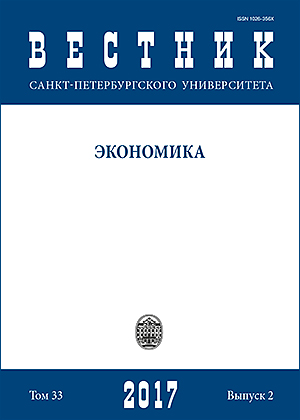BRICS in trade clusters: the prospects of convergent trade policies of large emerging economies
DOI:
https://doi.org/10.21638/10.21638/11701/spbu05.2017.205Аннотация
В статье анализируются глобальные торговые кластеры для того, чтобы иметь представление о последствиях экономического подъема стран БРИКС для международной торговой системы и ВТО. Страны БРИКС, без сомнения, доминируют в своих регионах в экономических и торговых оценках, а также конкурируют с государствами «Большой семерки» (G7) на глобальном уровне, а Китай даже обгоняет их. Но разделяют ли страны БРИКС общий подход к международной торговле, который можно было бы продвигать в качестве альтернативного порядка или вызова текущей международной торговой системе? До сих пор последствия роста БРИКС для международных торговых структур, многосторонних переговоров и ВТО остаются неопределенными.
В исследовании на основе кластерного анализа утверждается, что рост БРИКС не приведет к серьезным изменениям внутри ВТО из-за индивидуальных структур торговли членов — стран БРИКС. Тестируя страны с развивающейся экономикой на различных торговых переменных, рeзультат показывает наличие проблем для сотрудничества БРИКС в международной торговле, а также ложные предположения на данную тему в соответствующей литературе. Различия между формирующимися рыночными экономиками иногда намного больше, чем предполагалось, что делает сотрудничество довольно сложным в комплексе. В статье делается вывод о том, что ВТО в cвоей нынешней форме остается наиболее важным институтом управления торговлей для стран с развивающейся экономикой, поскольку расхождение в их структурах торговли мешает странам БРИКС бросить вызов системе, используя альтернативный подход.
Ключевые слова:
БРИКС, ВТО, международная торговля, кластерный анализ, страны с развивающейся экономикой
Скачивания
Библиографические ссылки
References
Washington Quarterly, 2010, vol. 33 (4), pp. 119–138.
The 17th GTA Report, London, 2015.
Foreign Affairs, 2008, vol. 87 (1), pp. 23–37.
Journal of Theoretical Politics, 1999, vol. 11(2), pp. 171–202.
Загрузки
Опубликован
Как цитировать
Выпуск
Раздел
Лицензия
Статьи журнала «Вестник Санкт-Петербургского университета. Экономика» находятся в открытом доступе и распространяются в соответствии с условиями Лицензионного Договора с Санкт-Петербургским государственным университетом, который бесплатно предоставляет авторам неограниченное распространение и самостоятельное архивирование.






